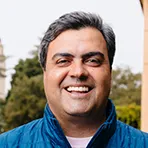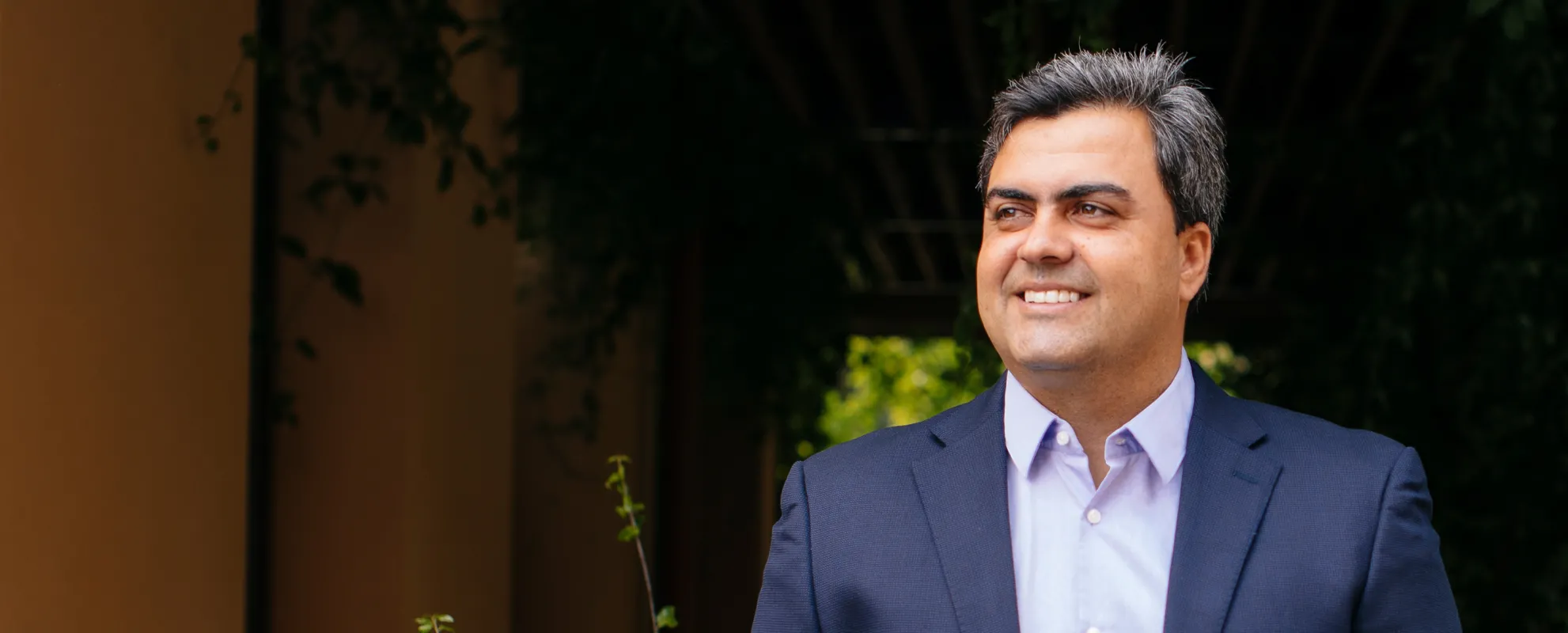Felipe Freitas is very likely the only member of the 2021 MSx cohort at Stanford GSB whose résumé includes this entry: professional surfer.
Born in Brazil and introduced to the sport as a child, Freitas began competing as a teenager and turned pro at age 18. He traveled the world on the pro surfing circuit for five “amazing” years, he says, gaining life lessons that still inform his outlook. “Surfing taught me humility, but also perseverance. I lost a thousand times more than I won. You feel your smallness when you’re under a 20- to 25-foot mountain of water. But you never give up.”
After leaving professional surfing, he joined Petrobras, the state-owned Brazilian oil and gas company, working first in procurement and supply chain operations and later as head of healthcare. He also managed parallel careers during these years, running a dry-cleaning franchise and guiding the careers of promising young surfers.
Freitas still loves surfing, but now the waves he is most interested in catching are in technology, AI, and electric vehicles. He came to Stanford, he says, to “become a better version of myself and then go back to the business world and grow beyond what I was doing.”
You seem intent on changing direction every few years.
Surfing taught me to take risks, and not fear the unknown. Be vulnerable, disrupt, try what has never been tried. The joy that comes from succeeding in the unknown will lift your spirit and make your life a heck of a journey.
Why did you stop surfing professionally?
The truth is that in the developing world it’s hard to make a living as an athlete. When I was hired by Petrobras it was a no-brainer. It was the largest company in the southern hemisphere at the time.
But you had another adventure before you started at Petrobras.
I sold my old car and bought an around-the-world ticket, and for the next four months I traveled to Australia, England, France, Spain, and the U.S. I enjoyed every piece of every day during those months, surfing, partying, and making the most of every experience. That was the perfect way of closing my pro surfing cycle and getting ready for a new career.
And then you started a sports marketing business on the side.
I felt the need to give something back to the sport, so I founded Outside Sports. Our initial goal was to work with young athletes to help them manage their careers. We did that for almost 10 years, working with kids who had the potential to become champions. One of them made the world championship tour. That story is all about giving back and creating impact, and I’m very proud of that journey.
You owned a Brazilian laundry franchise for four years. What did you learn from it?
It gave me on-the-ground experience of running a small business. When I scaled up in my career, I was way more perceptive about being customer-centric, and dealing with the overall matters of a business. It was like a lab experiment that gave me a lot of lessons to use in the future.
At Petrobras, you went from managing a team with fewer than 25 people to a leadership role that included hundreds of employees dispersed across many regions. What skills did that call on?
I had to effectively manage much broader ecosystems, with many more stakeholders, both internally and externally. That demanded a shift in my strategic mindset and an evolution in my leadership style, focusing more on managing talent, building and developing high performance teams, becoming more thoughtful in my decision-making process, and being more aware of the impact every decision creates.
What was the hardest part about making the choice to come to Stanford?
Leaving a high-level position at a company where I worked for 15 years to face the unknown, just like surfing. I came to the U.S. with my entire family — I have a five-year-old son and a one-year-old baby girl — and had to adapt to the country, the language, and the new routine.
You’ve said the most valuable thing about Stanford GSB has been the people you’ve met. Can you give me a few examples?
One for sure is [lecturer] Rob Siegel. He’s been an incredible resource for me throughout the year, from mentoring to exploring fields of knowledge, technology, and management. Also, [professor of organizational behavior] Jeff Pfeffer, who teaches Paths to Power. He was such an inspiration and helped me build confidence and understand better how to navigate power and influence, and those challenges we all face as we progress in our careers. Stanford does a fabulous job of teaching you how to collaborate, work together, and create an environment where everyone is excited about what they’re doing. I’ve started to think less about competitive advantage and more about collaborative advantage.
You’re now drawn to the auto industry, particularly electric cars. How did that interest come about, and where do you plan to take that?
I’m excited about every challenge where I can intersect strategy, operations, and technology. I love making an organization hum — whether in oil and gas, electric vehicles, or health care. I’m eager to find the next ops challenge. We don’t have electric vehicles in Brazil at all. No product, no infrastructure. So, when I came to the U.S., my questions were around energy transition, climate change, and the future of energy. Once I was here, I met some alumni from my program who are at Tesla and Rivian and learned that electrification is one of the key levers that will help the energy transition and bring forward solutions for climate change.
That’s a big transition from oil and gas.
It is. But if you think about supply chain, you can draw many similarities. It’s very technical, very engineering-based. There are a lot of similar challenges to keep operations running.
If you go back into supply chain work, you’ll find that world different after COVID-19. Will those impacts be permanent?
Most businesses will have to think more about the concept of what the French tire company Michelin calls “glocal.” You’ll have to think global and local in every decision you make because COVID-19 showed that a supply chain across the globe can be very fragile. I believe one of the biggest challenges of the next decade, for businesses and societies, will be creating supply chains that are at the same time flexible, resilient, and sustainable. And I want to be part of the solution.
You will be graduating soon. What will be your next thing to learn?
I spent the year taking notes about books I want to read after the program. I have more than 100 books on that list. Marketing professor Baba Shiv has fantastic research about the brain and how we make decisions; I’m curious to learn more. I also want to explore more applications of artificial intelligence and machine learning. The future will be driven by AI, and I want to keep digging, exploring, and learning.
Is surfing still a part of your life?
A few weekends ago we did a surfing day in Santa Cruz with my classmates. We went to Hawaii during the summer break. It’s in the DNA.
Photos by Elena Zhukova


